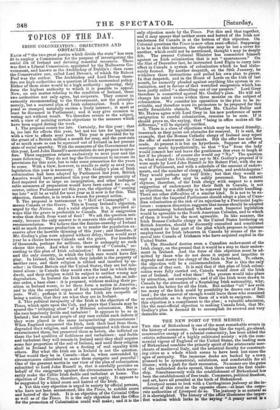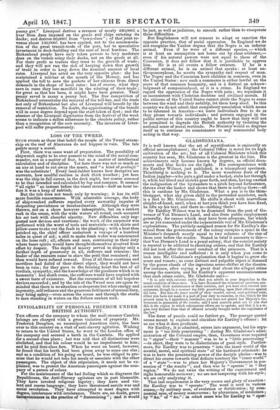THE NEW PORT OF THE MERSEY.
THE rise of Birkenhead is one of the most remarkable events in the history of commerce. To something like the rapid, go-ahead, constructive energy of a colonial community, has been added the artistic refinement of a highly cultivated society : with the com- mercial vigour of England or the United States, the leading men of Birkenhead combine the princely spirit of the aristocratic mer- chants of mediaeval Italy, and the artistical faculty for construct- ing cities as a whole which seems to have been lost since the ages of antiquity. The immense docks are backed by a town planned to be symmetrical, salubrious, and comfortable for all classes ; with a park for their recreation. No sooner are the gates of the unfinished docks opened, than there enters the first trade- ship. Simultaneously with the establishment of Birkenhead has been the establishment of free trade. Commerce, political freedom, and art, have all presided at the birth of Birkenhead. Liverpool seems to look with a Carthaginian jealousy at the in- stitution of this rival on the opposite shore—at least the corpo- rate authorities of Liverpool do so. The jealousy is as natural as- it is shortsighted. The history of the affide illustrates the imper- fect wisdom which lurks in the saying "A penny saved is a penny got." Liverpool derives a revenue of nearly 230,000/. a year from dues imposed on the goods and ships entering its docks; and derives 80,000/. from " town-dues" ; of that joint re- venue about 1502000/. has been applied, not to the accommoda- tion of the great transit-trade of the port, but to speculative investment in dock-building and the ease of local burdens. The Birkenhead people have only taken powers to levy moderate dues on the vessels using their docks, not on the goods at all. For their profit as traders they trust to the growth of trade; and they will not run the risk of keeping down that growth of trade in order to keep down the nominal amount of local rates. Liverpool has acted on the very opposite plan : she has maintained a toll-bar at the mouth of the Mersey, and has applied the toll to save the pockets of her citizens from direct demands in the shape of local rates: but of course, what they save in rates they lose manifold in the stinting of their trade ; for great as that has been, it might have been greater. Their penny saved is many a penny lost. The free competition of Birkenhead necessitates the removal of the toll-bar, and the trade not only of Birkenhead but also of Liverpool will benefit by the removal of restriction. No doubt, the apportioning of the benefit will in some degree depend upon the start taken at first ; and the absence of the Liverpool dignitaries from the festival of the week seems to indicate a sullen adherence to the obsolete policy, rather than a recognition of the new necessity. The interests of Liver- pool will suffer proportionately.



























 Previous page
Previous page